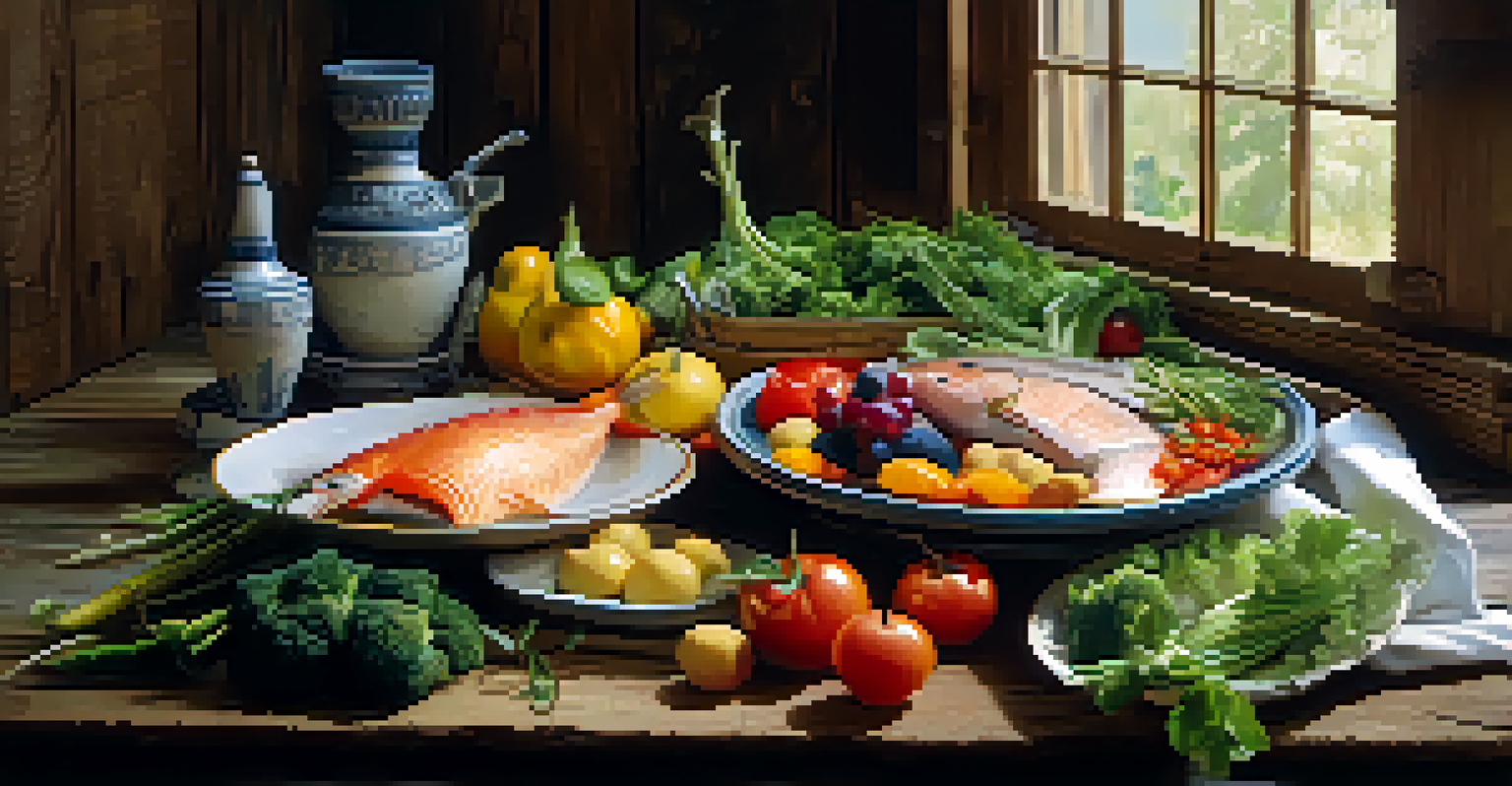Health Benefits of Raw Omnivorism: Pros and Cons Discussed

What is Raw Omnivorism and Its Core Principles?
Raw omnivorism is a dietary approach that incorporates both animal and plant foods in their raw, unprocessed state. This lifestyle choice emphasizes consuming fresh fruits, vegetables, meats, and fish, all uncooked to preserve nutrients. The idea is to harness the natural enzymes and vitamins that cooking can destroy, promoting optimal health.
Let food be thy medicine and medicine be thy food.
People who adopt raw omnivorism believe that this method of eating aligns more closely with our ancestral diets, which were rich in raw foods. By avoiding processed ingredients, they aim to reduce toxins and chemicals often found in modern diets. However, this approach raises questions about food safety and nutritional adequacy.
Understanding the fundamentals of raw omnivorism is crucial before diving into its health claims. Like any diet, it has its proponents and critics, and it's essential to weigh both sides before considering such a significant lifestyle change.
Potential Health Benefits of Raw Omnivorism
One of the primary benefits touted by raw omnivorists is the increased intake of vitamins and minerals. Raw foods are often packed with nutrients that can degrade during cooking. For example, vitamin C and certain B vitamins are sensitive to heat, so consuming fruits and vegetables raw may help you maximize your intake.

Additionally, raw omnivorism may promote better digestion. Raw foods contain natural enzymes that can aid in breaking down food, potentially leading to improved gut health. Many adherents report increased energy levels and enhanced overall wellness when they switch to this lifestyle.
Raw Omnivorism: A Unique Diet Choice
This dietary approach focuses on consuming both animal and plant foods in their raw, unprocessed state to maximize nutrient intake.
However, it's important to consider that these benefits can vary greatly from person to person. While some may thrive on a raw omnivorous diet, others might find it challenging to meet their nutritional needs without careful planning.
Nutritional Concerns with Raw Omnivorism
Despite its advantages, raw omnivorism is not without its challenges. One major concern is the risk of nutrient deficiencies, particularly in essential vitamins and minerals like B12, iron, and omega-3 fatty acids. These nutrients are often found in higher concentrations in cooked foods or animal products.
The doctor of the future will no longer treat the human frame with drugs, but rather will cure and prevent disease with nutrition.
Food safety is another critical issue. Consuming raw animal products can pose risks of foodborne illnesses, such as salmonella or E. coli. Proper sourcing and handling of these foods are paramount to minimize these risks, which can be daunting for some individuals.
Ultimately, those considering raw omnivorism should be aware of these potential pitfalls and may want to consult with a nutritionist to ensure a well-rounded diet.
Balancing Raw Foods with Cooking: A Hybrid Approach
For many, a hybrid approach that combines raw and cooked foods may offer the best of both worlds. Cooking can enhance the bioavailability of certain nutrients, like lycopene in tomatoes or beta-carotene in carrots, making them easier for the body to absorb. This balance can help individuals enjoy a wider variety of foods and flavors.
Additionally, incorporating some cooked foods can help mitigate food safety concerns associated with raw animal products. For example, lightly cooking meats or fish can reduce the risk of pathogens while still preserving some nutrients. This compromise allows for a more flexible and sustainable approach to eating.
Health Benefits and Nutritional Risks
While raw omnivorism can boost nutrient intake and digestion, it also poses risks of nutrient deficiencies and foodborne illnesses.
Adopting a hybrid diet can also make meal preparation easier, as it opens up a broader range of recipes and cooking methods. This flexibility can lead to a more enjoyable and varied diet, which is key to long-term adherence.
Real-Life Experiences: Success Stories and Challenges
Many individuals who have adopted raw omnivorism share inspiring success stories. They often report significant weight loss, improved skin health, and increased energy levels. Anecdotes about overcoming chronic health issues, such as digestive problems or fatigue, can be motivating for those considering this dietary shift.
However, it’s essential to recognize that not everyone has a positive experience. Some struggle with energy levels, cravings, or digestive discomfort as their bodies adapt. This variance in experiences underscores the importance of listening to one's body and making adjustments as needed.
These real-life stories remind us that every diet is highly personal, and what works for one person may not work for another. It's crucial to approach raw omnivorism with an open mind and a willingness to experiment.
The Role of Community and Support Groups
For those diving into the world of raw omnivorism, having a supportive community can make a world of difference. Online forums, social media groups, and local meetups provide spaces for sharing tips, recipes, and experiences. This sense of belonging can motivate individuals to stick with their dietary choices.
Support groups often facilitate discussions about the challenges of maintaining a raw omnivorous lifestyle, including meal planning and coping strategies for social situations. Sharing successes and setbacks can help individuals feel less isolated in their journey.
Community Support Enhances Success
Engaging with supportive communities can provide motivation, resources, and shared experiences to help individuals thrive on a raw omnivorous diet.
Ultimately, community can play a vital role in successfully navigating the ups and downs of any dietary change, including raw omnivorism. Building connections with like-minded individuals fosters accountability and encouragement.
Is Raw Omnivorism Right for You? Factors to Consider
Deciding if raw omnivorism is suitable for you involves evaluating your health goals, lifestyle, and personal preferences. It's crucial to consider how much time you're willing to invest in meal prep and sourcing high-quality raw ingredients. If you're busy or have limited access to fresh produce or meats, this lifestyle may present challenges.
Furthermore, understanding any pre-existing health conditions is significant. Individuals with certain digestive issues or compromised immune systems should approach raw foods with caution and consult healthcare professionals. Personalized advice can help determine if this diet aligns with your health needs.

In the end, listening to your body and reflecting on your experiences with food will guide you in making the best choice for your health and lifestyle.